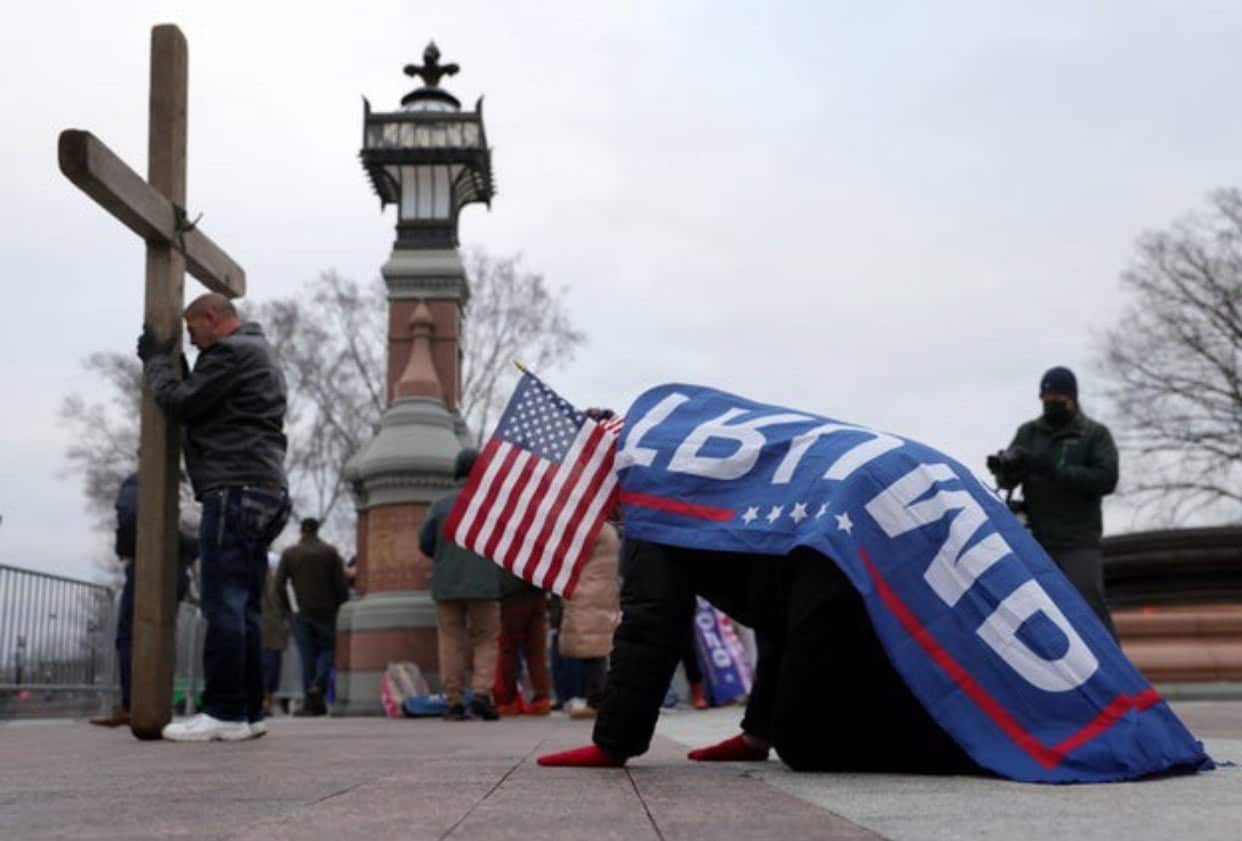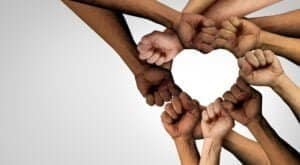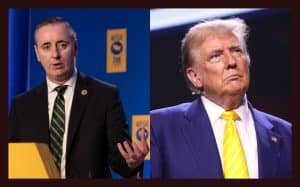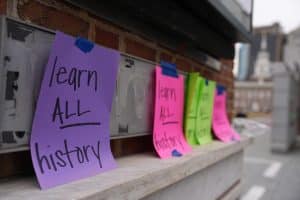Frederick Clarkson is a senior research analyst at Political Research Associates, a social justice research and strategy center that exposes the agenda and strategies of the U.S. and global Right, revealing the dangerous intersections of Christian nationalism, white nationalism, and patriarchy. Clarkson has written about politics and religion for four decades. He recently wrote a profile of Pennsylvania GOP gubernatorial candidate Doug Mastriano which caught a lot of people’s attention across the state.
Clarkson spoke with me to further unpack the beliefs, tactics, and goals of this movement as it not only explains a lot of what we are seeing across the state and country, but also locally in Bucks County. People need to understand the Christian right and start organizing against it, otherwise the state (and country) may be unrecognizable in four years.
Why did you decide to profile Doug Mastriano?
Well there were many reasons, but among them is that I have been looking at the New Apostolic Reformation for a long time. I had also been looking at Project Blitz, the Christian right state legislative campaign in the states of which Abby Abildness is the state director in Pennsylvania. And, I knew for a while that Mastriano was very involved with Abildness and others who were leaders in the New Apostolic Reformation, and that there was a story there. The trick was to figure out, well, what in the world’s going on with Doug Mastriano, this up and coming political figure. Eliza Griswold wrote about him last year in the New Yorker [“A Pennsylvania Lawmaker and the Resurgence of Christian Nationalism”]. I was quoted in the piece and provided background information, but I stayed on the case because the Christian right is what I’ve been studying for four decades now. And so I saw this latest manifestation of the political and religious impact of the Christian right and this particular iteration, the New Apostolic Reformation is an important development. I don’t think we’ve seen a candidate for an important public office – being governor of a major state – who’s anything like Mastriano since Pat Robertson ran for president in 1988.
You wrote that the Christian nationalist label applied to Mastriano and his supporters is more complicated than most people think. Can you explain what you mean by that?
Sure. Christian nationalism is something that I’ve written about for a long time. And the simplest idea is that people who believe that America was founded as a Christian nation, and usually that means applying some contemporary idea of Christianity and nationhood and issues as if the Founding Fathers had intended it that way. And that somehow … God and the vision of God and the Founding Fathers was lost or stolen along the way. And somehow that vision that intention has to be restored. And the way that most people use it, it’s basically just another term for the Christian Right. You know, conservative Christians, trying to apply their agenda to the rest of society. But it is more complicated than that because these folks have a transcendent vision of living in the End Times and bringing heaven to earth in a way that infuses their political work in the present with the authority, if not the powers of angelic hosts. And Abby Abildness and many of the people around Mastriano absolutely believe that’s true.
Some people talk about living the dream of whatever their dream is. In this case they’re living the metaphor, they’re living the metaphors of religious ideas as if they’re coming true in their own lives and that it’s their job to make them true in society. And, initially with that kind of Christian nationalism – and I can’t say whether Mastriano is specifically involved in this – but we can see those around him certainly are. But it not Christian nationalism in the way one might think, because it’s not about America at all. In their vision, America is just one place among many in the world. Their vision about a Christian End Times scenario is global. And they do think, and there are variations on the spectrum of thought on this, but the basic idea is that, there’s a special role for the United States in relationship to creating the circumstances that can allow for evangelization … and ultimately implementing God’s Kingdom around the world, but in also a particular relationship to the nation of Israel. The United States has a role to play, but it is not now and has never really been about America alone, as far as they’re concerned.
You’ve also written about Christian Dominionism, which obviously plays part in this. And that’s the idea that conservative Christians are called to take control of the world’s political and cultural institutions, which are known as the Seven Mountains: religion, family, government, business, education, arts, and entertainment and media. What kind of progress do you think this movement has made taking over these institutions in the last few decades?
They’ve been doing pretty well, doing quite well. This idea of Seven Mountains has been a fusion of a kind of theocratic Christianity called Christian Reconstructionism and the more theologically amorphous and experiential Pentecostalism. So if you grafted a very conservative theocratic theology onto the experientialism of Pentecostalism, you get something like what the Seven Mountains Dominionist movement is. All the Seven Mountains theology is about is breaking the broad idea of Christian dominion into understandable categories so that you don’t have to have a PhD in theology to know what they’re talking about. And, so anybody can talk about it … you know, my ministry isn’t being a pastor of a church, my ministry is the arts and I express my Christianity through the arts, or you know, my vision is government and making government into the godly institution it was intended to be. That’s the idea, so that whether people are in law or in business, they can consider their work, a ministry and many do. The power of the ideas and people who hold are not always ostentatious about expressing these things. Many people have never even heard of the terms seven mountains or dominionism, but they’re living it.
Do you believe that the current school board wars that we’re seeing happen right now is part of this movement?
It’s a coalitional thing. We’re not talking about one doctrinaire group of people marching forward and taking over school boards, although that’s part of it … but they know a couple of things. One is that it’s gonna take more than the people they’ve got in order to get the kind of electoral majorities that they need to get into offices. So they are making the kinds of relationships and coalitional alignments they need to get there. Anybody who’s been involved in any kind of coalitional work wherever you are on the political spectrum, knows it involves making some compromises. And agreeing to disagree on certain things and trying to set them in the background. We know from watching the school board battles, there are people who believe in constitutional governance, it is just that they think it needs to be more biblically aligned.
There are people who really don’t believe in constitutional governments and really just wanna tear the whole damn thing down. But in that case, you have to get on the school board in order to destroy it; if you wanna make the system dysfunctional. And of course, some people are profoundly racist and some people really aren’t. So how to navigate these things within their coalition is tricky stuff, but that doesn’t mean that they’re not coalescing and that they’re not trying to work things out along the way. So, yeah, I think we’re seeing an all of the above situation, but certainly Dominionists of a variety of flavors are in the thick of it.
Mastriano and his surrogates in this Christian movement use language and symbolism that expresses their intent to engage in spiritual warfare, while they also like to refer to themselves as an army and the U.S. as a battlefield. You’ve written that some understand their enemies on this earth right now to be literal demons, language I’ve actually heard from a local school board member. Given these beliefs, how real is the threat of violence from this movement moving forward?
I think violence is imminent, somewhere in the country where circumstances are right, probably where there is a sustained escalation of demonization of people and organizations that simply differ over policy and/or religious identity.
Every time in history, and it’s not limited to Christianity or Evangelicals, once you’ve decided that your opponent is the embodiment of evil, particularly supernatural evil, at some point that has to be addressed.
And it always ends in violence. There are no exceptions to that. Now, if we can create a kind of culture where we can de-demonize each other, where we’re not mutual embodiments of evil, and recognize that it’s our job to figure out how to live together in some kind of some kind of peace – that’s the answer. It’s not everything else. It’s that – to de-demonize the situation. And the much overused term polarization is the wrong word for this. It’s the demonization.
And we need to de-demonize.
People are polarized for many reasons. And they always have been in American politics. It’s a democracy! It’s always polarized. That’s what democracy is … but we resolve our differences through civil means called elections and other sorts of institutionalized processes. But this idea that somehow demonic individuals and forces have taken over our governmental institutions and are indoctrinating our children with Satanically inspired ideas, this is a dangerous situation.
What would this de-demonization process look like?
Well, that is the question, isn’t it? The first thing is to begin to recognize that that’s what’s happening. Many people are in denial. Oh, they’re just a bunch of crazy people. It’s a phase, you know, soon as they get over Trump, or whatever the excuse is.
It’s not passing. It’s not going away. It’s serious.
And these are people who live in our communities or nearby. They’re neighbors, our children play on the same little league teams, we see them in the supermarket, but we don’t know that they walk around seeing themselves surrounded by demons. And we are blindly going out into the world as if people who think that way don’t exist, or if they do they shouldn’t be taken seriously. So you begin by acknowledging reality, and that is reality.
Going from there, that’s gonna be the art of the occasion.
I believe that it will be about personal relationships. Developing trust relationships, where you can say, Hey Joe, you know, I know you don’t agree with me on a lot of things, but look, I may be an atheist. I may be a Christian of a different flavor, but I’m not possessed by demons. And you’ve known me for a long time and you and I really need to talk about this because I don’t want these kinds of ideas to come between us. It’s gonna be conversations like that that make the difference if we’re gonna choose to be neighbors, if we’re gonna choose to be fellow Christians, if we’re gonna choose to be fellow Americans – we have to find ways to navigate our differences. But first we have to acknowledge the nature of those differences.
Is there any pushback from the broader Christian community in the United States against this specific far right movement that is flourishing really, that is growing – there are churches, pastors everywhere, pastors working explicitly to elect Mastriano, even though according to IRS law and their churches’ nonprofit status, they’re not supposed to do that? Is there any kind of struggle within the broader Christian movement to kind of reconcile what’s happening here and that recognizes that this right-wing movement within the Christian community is a threat to democracy?
The answer is yes and no. There are now and there always have been many fine organizations that work on these kinds of things, the Interfaith Alliance in Washington is one, Americans United for Separation of Church and State is another. But in the last couple of years, a really remarkable alliance called Christians Against Christian Nationalism popped up. People of a variety of faiths were very concerned. Particularly because of the rise in antisemitism and anti-Muslim bigotry, but religious minorities like Muslims and Jews told their Christian friends that ‘we need stay in the background.’ You know, we appreciate your support, but you need to take this forward. You Christians are the ones who have the power and the influence and the standing to take on other Christians.
‘We don’t.’
And so Christians Against Christian Nationalism was formed, led by the Baptist Joint Committee for Religious Liberty, and they put together a really remarkable statement criticizing Christian Nationalism and describing the threat. They got a lot of prominent signatories, prominent Christians, heads of denominations, like Michael Curry, the Presiding Bishop of the Episcopal Church, John Dorhauer, the president of the United Church of Christ, and so on. And it’s really a tremendous statement and they’ve done a fair amount of publicity around it … And that’s a beginning. They recognized the problem, they defined it and they stated why they’re opposed to it.
And they began to mobilize.
But again, I think there’s much more that they could do. I think there’s much more that supporters could do. There’s one thing that none of these groups do, as good as they are, is be engaged in electoral politics. The genius of what the Christian Right has been able to do is to recognize that we live in a society that’s organized according to democracy, and although they may not like it and the compromises it forces them to make, but, hey, ‘we can learn the tools of electoral democracy. They’re not that hard. It ain’t rocket science.‘ And they began to do those very things. And one of the things that I always say is that they have mastered the tools of electoral democracy in order to erode or to end it. This is what we’re seeing right in front of our eyes.
Anybody who cares about preserving democratic institutions, although we all may differ on many things in religion and politics; we all have to recognize that there are people who are opposed to democracy itself or want to employ its institutions for anti-democratic purposes. These are people who are rising in public life right now. But the good news is that there are a lot more of us, in the broadest sense, than there are of them.
And what should Pennsylvanians expect if Doug Mastriano is elected governor? How do you think he’ll transform the state?
Well, I think that whatever understanding people may have about what the Christian right is and the issues they stand for, those things will be expressed in a Mastriano administration much in the way that they would’ve been in a Pat Robertson administration had he had been elected president of the United States. Lots of people are in favor of those things. Democratic processes have democratic consequences. And Mastriano and Pat Robertson have every right to do what they’re doing … but of course, just because you have the right to do it doesn’t mean that you’re entitled to winning – that’s up to everybody else.
So, yeah, I think that the Seven Mountains of Dominion that we’ve been talking about would be manifest in a Mastriano administration, as far as he can take it. He would populate his administration with people who are like-minded in that way. And that will find its way into policy regardless of what the legislature does because there are many things you can do in the executive branch without asking anybody’s permission and you can also push the envelope considerably. And I think Mastriano is the kind of guy who pushes the envelope.
Just two more things. First is how do you think the media has been covering this movement and the threat that it poses against democracy and democratic norms?
With some notable exceptions, not well – because it’s often not even acknowledged to even exist. It’s the kind of thing where reporters, should they bump up against it, don’t usually know what they’re looking at. And they don’t have the background knowledge and the vocabulary to even get into it. If you’re a reporter you’re faced with something that you don’t understand, it’s a brave and intelligent reporter who does. So, yeah, I think that the media at all levels of society – traditional mainstream media, the alternative progressive media, and certainly the religion press, have inadvertently been treating us like boiled frogs. You know, the story about a frog sitting in a pot of water, doesn’t really realize that the water’s warming up and warming up until they’re already cooked. And we’re all in the pot. The media has a job to do to help us to not be the boiled frog. And they’re mostly just not doing it.
Finally, is there anything else that you want to add that you think is important for readers to understand about what this movement is and the threat that it poses that we didn’t didn’t touch on yet?
We’ve touched on some important aspects of it, including the question of the media. But one thing that people are hard-pressed to understand is why the polling has Mastriano as close to Shapiro as he is. Where’s the support coming from? He doesn’t have much of a visible campaign. There are no events posted on the campaign website. But he still has clearly a considerable popular support.
Win or lose, that’s there.
And part of that support is clearly, this well organized, conservative Christian base. Polling doesn’t happen out of the blue, particularly when the organizing is sustained over time. Numbers are not always right, but they do reflect a certain substance of reality – that a relative minority of the population, this coalition of conservative Evangelicals and conservative Catholics (who we shouldn’t leave out and are much a part of it), and some of the other kinds of groups we’ve been talking about, which is a new kind of development, it doesn’t mean that they’re majorities, it means that they’re a well organized minority. Even in, you know, in a good presidential election year, there is about 60-65% turnout of the eligible voters, and the farther down the electoral ladder you go, particularly in an off-year or a midterm election, the smaller number of people that are participating and less turnout. So if you are a well organized minority, you can maximize your influence and power by being better organized than your majority opponents. This is the story of recent politics in the United States and explains much of the rise of the Christian Right. And I think it explains a good deal of what’s going on in Pennsylvania right now.
This transcript was lightly edited for clarity.






